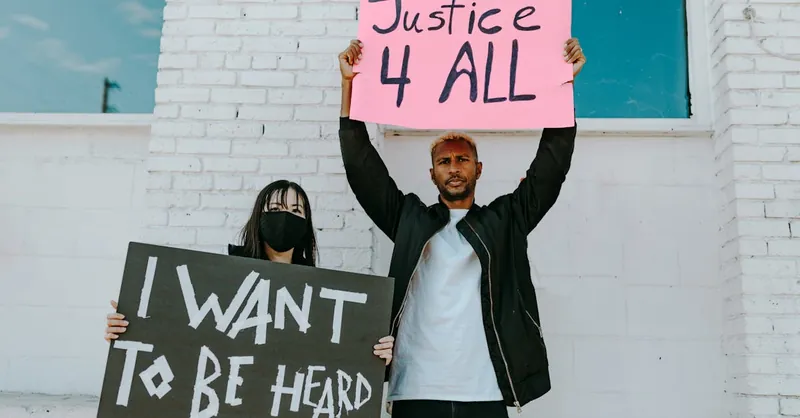Exposing Karen Entitlement: Unmasking Social Injustice
Category: Social Issues
Why Exposing Karen Entitlement Matters Now
If you've stumbled upon the term “Karen” and felt a mixture of frustration and curiosity, you're in the right place. You’re likely a socially conscious reader, eager to understand the recurring patterns of entitlement displayed by so-called 'Karens' who disrupt fairness and fuel social injustices. You might have seen viral videos, social media rants, or felt the sting of encountering such behavior firsthand—maybe in stores, public places, or online interactions. Your pain point is clear: seeking not just to condemn these actions but to unpack the cultural and social dynamics behind them.
This post dives deep into the anatomy of Karen entitlement—not just a meme, but a phenomenon that reflects broader issues of privilege, systemic injustice, and social disruption. Unlike typical posts that only recite famous encounters, this article critically investigates how these behaviors perpetuate inequality and why they should concern us all. We’ll explore social psychology, historical context, and real examples, all while equipping you with a framework to recognize and confront this madness constructively. So, if you want a nuanced, comprehensive, and thought-provoking critique that goes beyond anecdotes, keep reading—you’ll gain new insight on dismantling this disruptive entitlement culture.
- Why Exposing Karen Entitlement Matters Now
- Defining Karen Entitlement: Origins and Evolution of the Term
- Recognizing Entitlement Patterns: Typical Behaviors That Stir Up Injustice
- The Social Psychology Behind Karen Behavior: Privilege and Power Dynamics
- Real-Life Examples: Viral Incidents That Spotlight Karen Madness
- Cultural Commentary: How Media and Society Perpetuate the Karen Stereotype
- Impact on Social Justice: Why Karen Entitlement Exacerbates Inequality
- Conflict Management Strategies: Responding Effectively to Entitled Disruptions
- Legal and Ethical Boundaries: When Karen Behavior Crosses the Line
- Empathy vs Enablement: Navigating Compassion without Tolerating Injustice
- Calls for Change: How Communities and Organizations Can Combat Entitlement
Defining Karen Entitlement: Origins and Evolution of the Term
The term “Karen” has evolved from a simple name to a culturally charged label that symbolizes a specific kind of entitlement, privilege, and social disruption. Originally gaining traction on social media platforms around the mid-2010s, "Karen" became shorthand for individuals, typically white women, who exhibit an over-the-top sense of entitlement, demand special treatment, and often display rude or racist behavior. While early usage was mostly humorous or satirical, the term quickly grew into a powerful critique of systemic social issues, particularly those revolving around race, class, and privilege.
Understanding the origins of Karen entitlement requires looking beyond the meme to the socio-historical context that fuels such behavior. This entitlement is not merely rude conduct; it is deeply connected to systems of power in which certain demographics, especially middle-aged white women, have historically wielded disproportionate influence by weaponizing their social and racial privilege. Over time, "Karen" has come to represent:
- Demanding unreasonable special treatment or exceptions to rules.
- Using authoritative tones or calling authorities to escalate trivial matters.
- Exhibiting disregard for others’ rights and feelings, often crossing into microaggressions or blatant discrimination.
- Leveraging systemic inequalities, sometimes unknowingly, that protect and amplify her ability to assert dominance or control in social spaces.
By tracing this evolution, it becomes clear that "Karen entitlement" is a symptom of larger social dysfunctions—where entitlement turns into active disruption of fairness and equity. Recognizing this definition empowers us to confront not just individual behaviors but also the underlying structures that enable such entitlement to flourish unchecked.

Image courtesy of cottonbro studio
Recognizing Entitlement Patterns: Typical Behaviors That Stir Up Injustice
To effectively expose and challenge Karen entitlement, it’s crucial to recognize the common behavioral patterns that fuel unfairness and social disruption. Karen entitlement is not always blatant; it often manifests in seemingly ordinary interactions that, when viewed collectively, reveal a deeper trend of entitlement and bias. These behaviors consistently stir up injustice by undermining rules, marginalizing others, and leveraging privilege to dominate situations.
Common entitlement patterns include:
-
Demanding Immediate and Special Treatment: Karens frequently insist on skipping lines, bending rules, or receiving exceptions simply because they believe their needs or status outweigh others’. This undermines fairness in public and private spaces, reinforcing a sense of superiority over community norms.
-
Calling Authorities Unnecessarily: Whether it’s repeatedly requesting to speak to a manager or calling police over minor issues, this escalation tactic weaponizes institutional power. It often targets marginalized individuals, reinforcing systemic discrimination and creating fear or harm where none should exist.
-
Disregarding Others’ Rights and Experiences: Karens exhibit a lack of empathy, frequently interrupting, criticizing, or invalidating others—especially when those others are people of color or less privileged. These microaggressions perpetuate exclusion and reinforce societal hierarchies.
-
Using Tone and Body Language to Intimidate: Beyond words, Karens rely on condescending speech, loud voices, and aggressive gestures to assert control. This form of intimidation silences dissent and enforces compliance, deepening social divides.
-
Exploiting Racial and Social Privilege: Many entitlement behaviors are underpinned by unacknowledged systemic advantages. By invoking race, class, or gender privilege, Karens maintain and amplify inequitable power dynamics, often without self-awareness.
By identifying these patterns, readers can see beyond isolated incidents to understand the structural nature of Karen entitlement. This recognition is a critical step toward dismantling the behaviors that spread injustice and protect entrenched privilege. Armed with this framework, individuals and communities can better challenge entitlement wherever it arises, fostering greater equity and respect in everyday interactions.

Image courtesy of Keira Burton
The Social Psychology Behind Karen Behavior: Privilege and Power Dynamics
To truly grasp why Karen entitlement persists and often escalates into social disruption, we need to delve into the social psychological foundations underpinning these behaviors. At its core, Karen behavior is deeply intertwined with privilege and power dynamics—complex constructs that influence how individuals perceive their social standing and their right to control situations.
Privilege as an Invisible Social Currency
Privilege, especially racial and class privilege, acts like an unseen currency that influences interactions but often goes unacknowledged by those who benefit from it. For many Karens, this privilege manifests as an unquestioned assumption of superiority and entitlement. Social psychologists call this phenomenon “dominant group entitlement,” where members of a socially dominant group expect preferential treatment because of ingrained societal hierarchies.
This entitlement is reinforced through repeated social validation. When Karens call authorities or demand special treatment and face little resistance—or even receive compliance—they internalize these actions as justified. This creates a feedback loop where privilege is both exercised and normalized, making it harder to interrupt the cycle of injustice and entitlement.
Power Dynamics: Control, Status, and Social Enforcement
Karen behavior also reflects a desire to assert control and maintain social status. The power Karens wield is often subtle yet impactful: by leveraging their race, gender, and socio-economic status, they can command attention and enforce rules selectively. This is more than personal rudeness; it is an enactment of systemic power imbalances.
Social dominance theory explains how individuals in privileged groups use institutional and interpersonal power to reinforce group superiority. Karens illustrate this by:
- Exercising gatekeeping behaviors—trying to control access to services, spaces, or privileges.
- Mobilizing institutional authorities—such as managers or law enforcement—to legitimize their complaints, turning personal bias into official action.
- Signaling superiority through tone and mannerisms that reinforce social hierarchies and silence dissent.
Understanding the social psychology behind Karen entitlement exposes how these behaviors are not isolated incidents but embedded in broader structures of privilege and inequality. This awareness is critical for dismantling the social acceptance of Karen madness, shifting cultural norms toward accountability, inclusivity, and fairness.

Image courtesy of Mikhail Nilov
Real-Life Examples: Viral Incidents That Spotlight Karen Madness
Nothing exposes the reality of Karen entitlement more vividly than real-life viral incidents where entitlement crosses the line into outright social disruption and injustice. These highly publicized episodes serve as powerful case studies, illustrating how Karen behavior not only undermines fairness but also weaponizes privilege in ways that disproportionately harm marginalized communities.
Notorious Viral Moments That Define Karen Madness
-
The “Central Park Karen” Incident (2020)
In one of the most infamous examples, a white woman called the police on a Black birdwatcher in New York’s Central Park for simply asking her to leash her dog. This incident went viral, highlighting how Karen entitlement often involves racial profiling and the misuse of law enforcement as a tool for social control. The woman’s insistence on calling authorities for a non-crime amplified systemic racism and sparked nationwide outrage. -
“BBQ Becky” and the Greater Societal Context
Another viral event featured a white woman calling the police on Black people having a barbecue in a public park. Dubbed “BBQ Becky,” this episode perfectly encapsulates how minor public activities become escalated through Karen entitlement into police interventions, exposing the racialized double standards and the readiness to police Black bodies for benign activities. -
Retail Rampage: Karen vs. Store Employees
Countless viral videos show Karens berating retail employees, demanding to “speak to the manager” over trivial inconveniences. These confrontations often end with employees subjected to verbal abuse while the Karen’s entitlement is defended by a misguided belief in customer supremacy. Such incidents highlight how commercial entitlement exacerbates worker exploitation and fosters hostile service environments.
Why These Viral Examples Matter
These high-profile cases are not isolated entertainment clips but critical reminders of how entitlement behavior escalates social injustice. They demonstrate how Karens:
- Convert personal biases into public actions that harm individuals and communities.
- Exploit institutional power asymmetries disproportionately impacting marginalized groups.
- Normalizing entitlement escalates microaggressions into systemic issues, in turn perpetuating cycles of discrimination and inequity.
By examining these viral incidents, readers can connect the dots between seemingly isolated behaviors and the broader social ramifications. Recognizing these patterns allows for a more informed and proactive stance against Karen entitlement, calling for accountability that transcends viral moments and drives lasting social change.

Image courtesy of Life Matters
Cultural Commentary: How Media and Society Perpetuate the Karen Stereotype
The widespread prominence of the Karen stereotype is not an organic phenomenon but one deeply shaped and amplified by media narratives and societal attitudes. From viral videos to late-night comedy sketches, the media has played a significant role in both highlighting and entrenching the image of the entitled, confrontational Karen. While this exposure can raise awareness, it also risks simplifying complex issues into caricatures, sometimes distracting from the systemic roots of entitlement and privilege.
Media’s Role in Amplifying Karen Entitlement
-
Sensationalism and Viral Culture: Viral clips of Karen outbursts are prime content for engagement-driven platforms. The rapid spread of such videos fuels a feedback loop where the most outrageous and extreme behaviors gain traction, leading to overgeneralization and sometimes unfair stereotyping of individuals based solely on gender or race.
-
Normalization of Karen Behavior as Entertainment: Television shows and online memes often portray Karens as comedic foils or irrational antagonists, inadvertently trivializing the real harm caused by entitlement-driven actions. This entertainment framing makes it easier for society to shrug off Karen behavior as harmless quirk rather than recognizing it as a form of social aggression rooted in privilege.
-
Selective Framing and Racial Implications: Media tends to highlight Karen incidents involving white women contrasted against people of color, which, while important to expose racialized entitlement, can also reinforce racial stereotypes or fuel cultural backlash. Such framing demands critical attention to how narratives are constructed and who controls the storytelling.
Societal Factors That Reinforce Karen Entitlement
Beyond the media, broader societal structures sustain and normalize entitlement behaviors:
-
Cultural Conditioning of Assertiveness and “Customer is Always Right” Attitudes: Society often rewards assertiveness from certain demographics, especially white women, linking it erroneously with empowerment. This conditioning conflates confidence with entitlement, providing social license for Karen behavior.
-
Systemic Privilege Reinforcement: Social institutions frequently overlook or inadequately challenge entitlement when displayed by privileged groups, perpetuating a cycle where Karen behaviors go unchecked or are excused.
-
Community Tolerance and Social Passivity: Bystanders and witnesses often hesitate to confront Karen entitlement, sometimes due to fear of confrontation or social norms discouraging interference. This passivity allows entitlement to persist and escalate.
Understanding how media representations and societal norms collaborate to perpetuate the Karen stereotype is essential. It moves the conversation beyond individual blame to recognizing the cultural ecosystem that enables entitlement to thrive, equipping readers with the perspective needed to critically evaluate and challenge Karen madness in both public discourse and daily life.

Image courtesy of Sami Aksu
Impact on Social Justice: Why Karen Entitlement Exacerbates Inequality
Karen entitlement does far more than create inconvenient or uncomfortable moments—it actively exacerbates social inequality and undermines the pursuit of justice. When entitlement manifests through actions like unwarranted police calls, demands for special treatment, or dismissive behavior toward marginalized groups, it reinforces systemic disparities and perpetuates cycles of discrimination.
At the heart of this issue is the way Karen entitlement weaponizes privilege to maintain and deepen existing power imbalances. For instance, calling law enforcement on innocent people, predominantly people of color, taps into a brutal history where oppressive institutions have been used as tools of racial and social control. This not only causes immediate harm but also chills the voices and freedoms of vulnerable communities, making public spaces less safe and inclusive.
Moreover, Karen entitlement disrupts social justice efforts by:
- Diverting resources and attention: False reports or exaggerated complaints can drain community services and police time away from serious issues affecting marginalized populations.
- Undermining solidarity and trust: By belittling or invalidating the experiences of others, entitlement breeds division rather than fostering empathy or collective action.
- Normalizing discriminatory behavior: When entitlement goes unchecked, it signals to others that such acts of bias and exclusion are acceptable, perpetuating a hostile environment for those fighting for equity.
Ultimately, confronting Karen entitlement is not just about calling out rude individuals—it is a necessary step toward dismantling the broader systems of inequality and injustice. Recognizing how entitlement behaviors intersect with race, class, and power enables us to address root causes rather than merely treating symptoms, advancing a more just and equitable society for all.

Image courtesy of RDNE Stock project
Conflict Management Strategies: Responding Effectively to Entitled Disruptions
Encountering Karen entitlement—whether in public spaces, workplaces, or online—often triggers tension and can escalate conflicts rapidly if mishandled. To effectively respond and de-escalate these entitled disruptions, it is essential to employ conflict management strategies that prioritize calm, clarity, and boundary-setting. This approach not only protects your own well-being but also diminishes the power Karens seek by weaponizing entitlement and confrontation.
Key Strategies to Manage Karen Entitlement Conflicts
-
Maintain Composure and Neutrality
When confronted with entitlement-fueled demands or hostility, resist the impulse to mirror aggression or become defensive. Remaining calm signals control and discourages escalation, while emotional neutrality prevents the situation from spiraling into unproductive confrontations. -
Set Clear Boundaries with Assertiveness
Use assertive communication to define what behavior is acceptable without aggression. Phrases like “I’m happy to help within our guidelines” or “I understand your concern, but these are the rules everyone must follow” reinforce fairness and limit the Karen’s narrative of special treatment. -
Avoid Engaging in Power Struggles
Entitled individuals often seek dominance by pushing boundaries or eliciting overpowering reactions. Instead of entering a battle of wills, strategically disengage from circular arguments or ultimatums. Redirect focus to factual information or request to involve neutral third parties (managers, security) only if necessary. -
Document and Report Incidents When Appropriate
In cases where entitlement behavior crosses into harassment, discrimination, or threats, keep detailed records of interactions. Reporting these incidents to supervisors or authorities safeguards both personal and institutional integrity while holding entitled actors accountable. -
Practice Empathy Without Enabling
While Karen entitlement is rooted in privilege and often harmful, understanding the social conditioning or insecurities driving the behavior can provide perspective. Empathy reduces personal frustration but be cautious not to enable entitlement by excusing disrespect or unfairness.
Why Effective Conflict Management Matters
Mastering these conflict management techniques is critical for mitigating the disruptive impact of Karen entitlement while reinforcing social norms of respect and fairness. Proactive responses help prevent small entitlement incidents from becoming systemic problems that perpetuate injustice and inequality. In addition, clear, calm opposition to entitlement asserts community standards, promoting accountability and discouraging repetition of disruptive behavior.
By equipping yourself with these conflict management strategies, you empower both yourself and your community to confront entitlement madness constructively—transforming moments of disruption into opportunities for education, equity, and progress.

Image courtesy of Photo By: Kaboompics.com
Legal and Ethical Boundaries: When Karen Behavior Crosses the Line
While many instances of Karen entitlement manifest as rude or disruptive behavior, it is critical to recognize that some actions cross legal and ethical boundaries, transforming entitlement into potentially unlawful conduct. Understanding these boundaries helps differentiate between mere social inconvenience and actions that warrant formal accountability or legal intervention.
When Karen Behavior Becomes Illegal
Entitlement behaviors escalate into legal issues primarily when they involve:
- Harassment or Threats: Repeated verbal abuse, intimidation, or physical threats toward individuals—especially employees or marginalized groups—can constitute harassment and sometimes criminal behavior.
- False Reporting: Knowingly making false police reports or false claims to authorities, often to weaponize institutional power against innocent people, is illegal in most jurisdictions and can result in charges or civil liability.
- Discrimination: Using entitlement as a guise to discriminate on the basis of race, gender, or other protected characteristics violates civil rights laws and anti-discrimination statutes.
- Trespassing or Disorderly Conduct: Refusing to comply with lawful directives or disrupting public order under entitlement pretenses can lead to citations, fines, or arrest.
Ethical Responsibilities and Social Accountability
Beyond legal implications, Karen entitlement raises serious ethical concerns related to fairness, respect, and community well-being. Ethical boundaries are breached when entitlement:
- Exploits systemic privilege to harm others or undermine equitable access to resources and opportunities.
- Dismisses the dignity and rights of others, using social status to silence or marginalize voices.
- Undermines trust and community cohesion by fostering fear, resentment, or injustice.
Addressing entitlement must therefore include not only legal deterrence but also ethical education and cultural shifts that encourage accountability and empathy. Promoting awareness about these legal and ethical boundaries empowers individuals and institutions to recognize when Karen behavior no longer falls within acceptable social norms and requires rightful intervention.
By highlighting the intersection of entitlement, law, and ethics, this framework helps sharpen the focus on the most damaging aspects of Karen madness—those that perpetuate injustice under the guise of personal “rights” but ultimately erode social fairness and legal integrity.

Image courtesy of KATRIN BOLOVTSOVA
Empathy vs Enablement: Navigating Compassion without Tolerating Injustice
In addressing Karen entitlement, striking a balance between empathy and enablement is crucial for promoting social justice while preventing the reinforcement of harmful behaviors. Empathy allows us to understand that entitlement often stems from deeper insecurities, social conditioning, or learned privilege—acknowledging this can reduce personal frustration and foster more constructive engagement. However, empathy must not slide into enablement, which unwittingly tolerates injustice by excusing or downplaying entitled actions that perpetuate inequality and disrupt fairness.
Why Empathy Matters—but Has Its Limits
Approaching Karen behavior with empathy involves recognizing how systemic privilege and social conditioning shape one's worldview and actions. This understanding can open opportunities for education and meaningful dialogue rather than immediate condemnation. Yet, empathy does not mean excusing entitlement or allowing harmful conduct to continue unchecked. Enabling entitlement by tolerating disrespect, dismissing others’ suffering, or accommodating unreasonable demands only serves to perpetuate the cycle of injustice.
Setting Boundaries to Prevent Enablement
To effectively counter Karen entitlement without sacrificing compassion, it is essential to establish clear boundaries:
- Hold individuals accountable for behaviors that impact others negatively, regardless of underlying causes.
- Reject entitlement-driven exceptions that undermine fairness or community rules.
- Support victims of entitlement behavior with validation and resources rather than silencing or minimizing their experiences.
- Promote systemic change by addressing privilege and power structures instead of focusing solely on individual actions.
By consciously navigating between empathy and enablement, communities can foster an environment where compassion fuels awareness and growth—but never at the expense of equity, respect, and justice. This nuanced approach empowers us to challenge Karen entitlement responsibly, transforming confrontations from cycles of disruption into opportunities for accountability and social progress.

Image courtesy of RDNE Stock project
Calls for Change: How Communities and Organizations Can Combat Entitlement
Addressing Karen entitlement requires more than individual awareness—it demands collective action by communities and organizations committed to fostering fairness, equity, and accountability. By implementing proactive strategies, groups can dismantle the culture of entitlement that enables Karen behavior and protect vulnerable populations from the disruption and injustice it causes.
Community-Led Initiatives to Challenge Entitlement
Communities serve as a frontline defense against entitlement by cultivating norms that reject privilege-based disruptions and embrace inclusive engagement. Effective community responses include:
-
Education and Awareness Campaigns: Informing the public about the dynamics of entitlement and privilege helps demystify Karen behavior and highlights its social consequences. Workshops, neighborhood meetings, and social media outreach can empower individuals to recognize and intervene when entitlement arises.
-
Supporting Bystander Intervention: Encouraging community members to safely confront or report entitlement incidents fosters collective responsibility. Training in respectful confrontation and conflict de-escalation equips bystanders to disrupt entitlement cycles without escalating conflicts.
-
Building Support Networks for Targets of Entitlement: Establishing resources such as peer groups, legal aid, or counseling services provides critical backing to those negatively affected by entitled behaviors, reinforcing that victims are not alone.
Organizational Policies to Mitigate Entitlement Culture
Organizations—whether businesses, schools, or public institutions—play a pivotal role in setting clear expectations and consequences surrounding entitlement behaviors. Practical measures include:
-
Implementing Robust Anti-Entitlement and Anti-Discrimination Policies: Clear codes of conduct that specifically address entitlement behavior deter misuse of authority and privilege. These policies should outline reporting mechanisms and consequences for violations.
-
Training Staff in Equity and Conflict Resolution: Employees aware of entitlement dynamics are better prepared to handle incidents without reinforcing harmful power imbalances. Training can focus on cultural competency, implicit bias, and de-escalation techniques.
-
Creating Transparent Complaint and Accountability Systems: Systems that enable victims and witnesses to report entitlement-related grievances confidentially and receive timely responses build trust and reinforce organizational commitment to equity.
By embedding these strategies into community culture and organizational frameworks, we can transform environments where entitlement once thrived into spaces defined by respect, fairness, and social justice. This collective approach is essential to uprooting the systemic drivers of Karen entitlement and fostering lasting change—making calls for special treatment or weaponized privilege socially unacceptable and actively countered at every level.

Image courtesy of Alfo Medeiros
